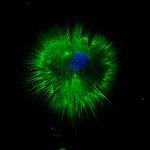Lien vers Pubmed [PMID] – 29358916
Front Aging Neurosci 2017;9:435
The Akt kinase has been widely assumed for years as a key downstream effector of the PI3K signaling pathway in promoting neuronal survival. This notion was however challenged by the finding that neuronal survival responses were still preserved in mice with reduced Akt activity. Moreover, here we show that the Akt signaling is elevated in the aged brain of two different mice models of Alzheimer Disease. We manipulate the rate of Akt stimulation by employing knock-in mice expressing a mutant form of PDK1 (phosphoinositide-dependent protein kinase 1) with reduced, but not abolished, ability to activate Akt. We found increased membrane localization and activity of the TACE/ADAM17 α-secretase in the brain of the PDK1 mutant mice with concomitant TNFR1 processing, which provided neurons with resistance against TNFα-induced neurotoxicity. Opposite to the Alzheimer Disease transgenic mice, the PDK1 knock-in mice exhibited an age-dependent attenuation of the unfolding protein response, which protected the mutant neurons against endoplasmic reticulum stressors. Moreover, these two mechanisms cooperatively provide the mutant neurons with resistance against amyloid-beta oligomers, and might singularly also contribute to protect these mice against amyloid-beta pathology.
